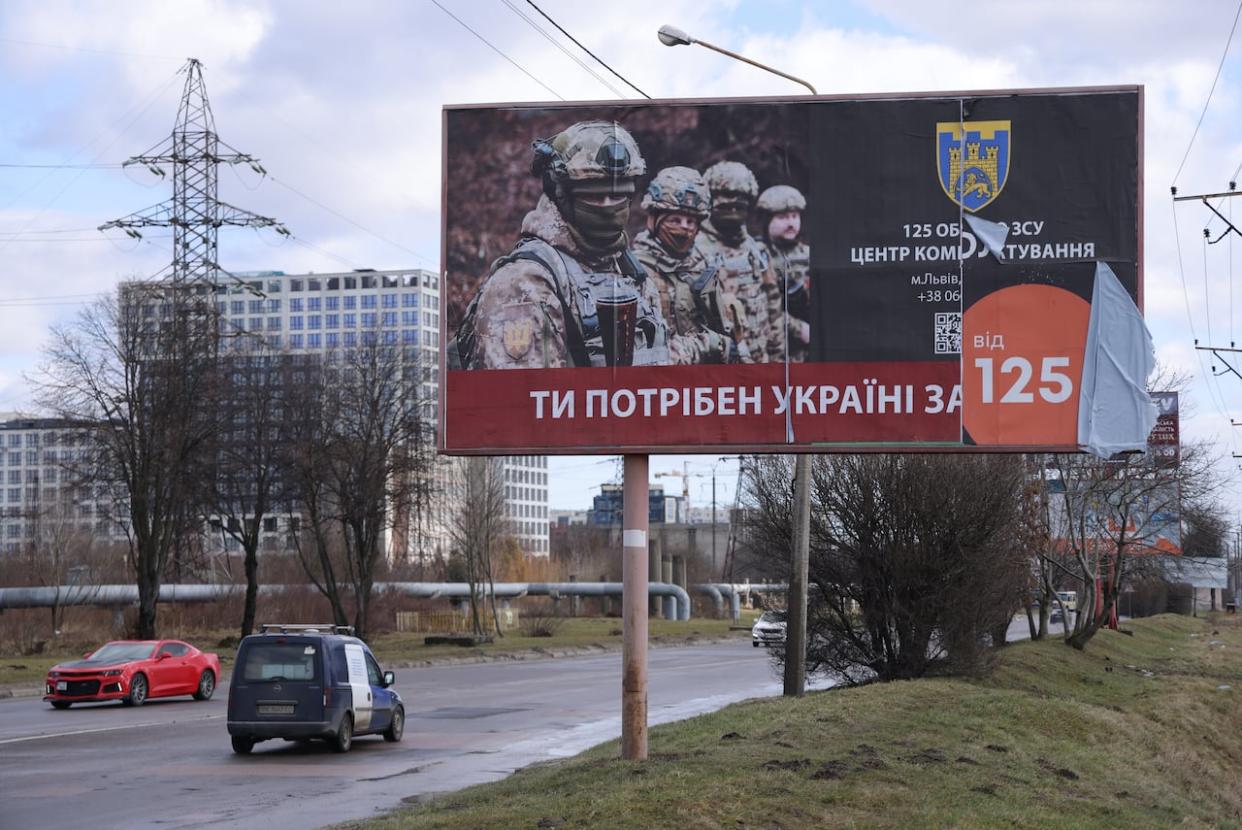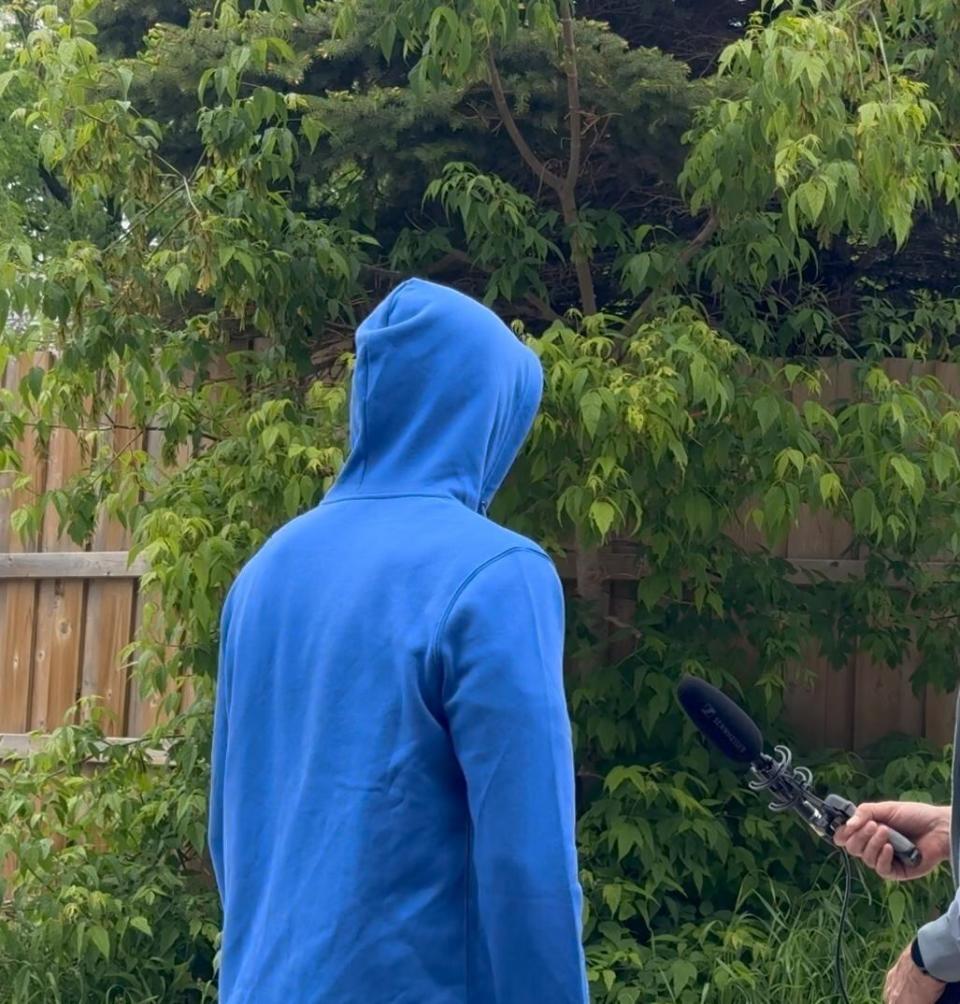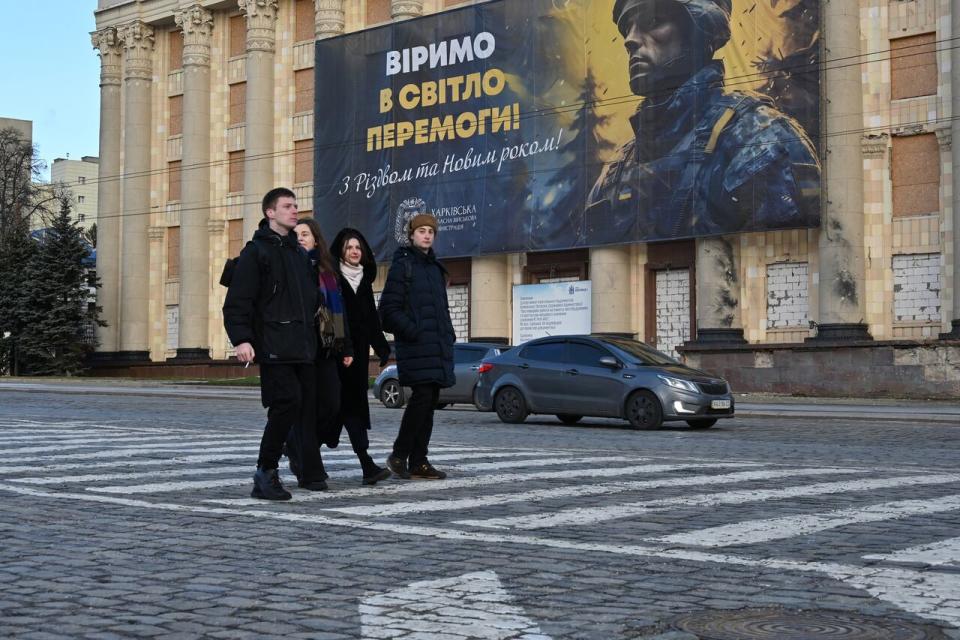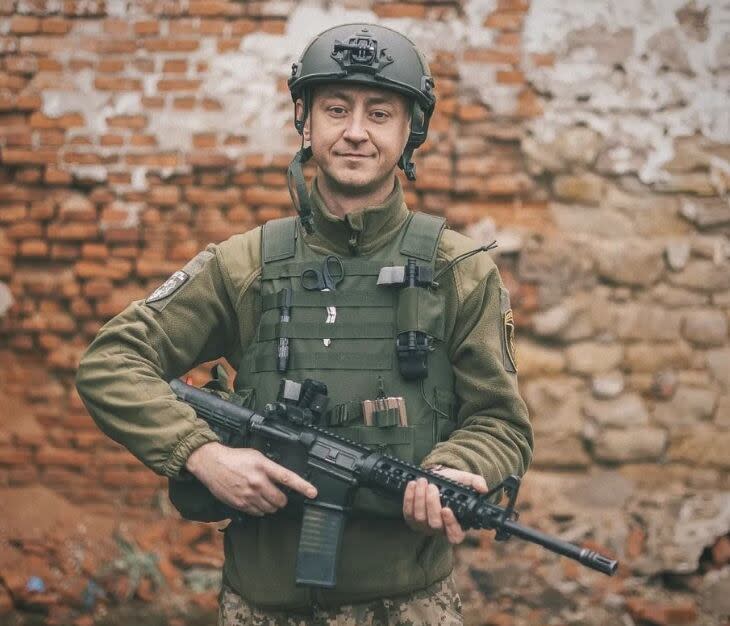For Ukrainians in Canada, new conscription rules increase pressure to fight

Dmytro lives a simple life in Winnipeg — baking bread at a supermarket or playing volleyball with fellow Ukrainians.
Dmytro, who is non-binary and uses the pronoun they, says they feel safe in a country that accepts them as they are. But they know it's different in Ukraine.
"You're going to be looked upon as a person who is weak, a person who is afraid, the person who is working [for] their enemy," said Dmytro, a tall, slim 20-something with a mop of brown hair.
They didn't want their age or full name used, fearful of being targeted for fleeing the Russia-Ukraine war. In fact, no Ukrainian in Canada that CBC Radio spoke to for this story wanted their full name used.
The reason: Ukraine has recently dropped the conscription age from 27 to 25, increased fines for draft dodgers to half the average monthly wage and ordered embassies to stop renewing passports for Ukrainian men living abroad. All of this is part of an effort to get them to return home — and bolster the military's ranks as the war enters its third summer.
New laws require Ukrainian men between 18 and 60 to update their draft data with military conscription centres inside the country — including Dmytro, who has been living in Canada for 18 months.
As a result, emotions are running high among those who fled the war and those on the front lines who feel abandoned.
'No one is really safe'
In the bedroom of their modest basement apartment, Dmytro is watching a chaotic scene: smartphone video from Ukraine that shows what they fear is their eventual fate, and that of their father.
In the video posted to social media earlier this month, a group of men in military fatigues try to force another man into a police car. He resists, aided by a couple of women, and eventually runs off. The women and the men in fatigues yell at each other. One man attempts a headbutt. A Ukrainian flag flaps in the background.
WATCH | Confrontation on the streets of Kyiv:
Dmytro says social media posts like this one have become common in their home country. Ukrainians say the videos show military officials grabbing men off the street to send them to recruitment centres, where they are medically cleared for duty and sent to the front lines.
Most of the videos are unverified, but a recruitment centre in Kyiv said its staff, as well as members of the national police force, appeared in this particular video. The statement said they had identified people evading military duty, and were acting lawfully.
"We do hear the constant screams of women all around, trying to protect this civilian who they don't know, but they are seeing what is happening," Dmytro said as he watched the video. "And obviously they are seeing their sons, they're seeing their fathers, they're seeing their husbands [in] his place, because no one is really safe [from conscription]."
Worrying for their father
Dmytro, whose parents are still in Kyiv, worries their father, who is in his 50s, will be called up. The pair talk on the phone almost every week.
A 57-year-old shoemaker who Dmytro's father knows recently went to a recruitment centre to update his military data. Within days, he was fighting on the front line.
Dmytro says everyone is afraid.
"It's been constantly portrayed in media that Russian mobilization is bad, but Ukrainian mobilization is good. Yet there is no difference, currently."

Dmytro gives several reasons for avoiding the war, including doubt about whether Ukraine can regain all its territory with military power alone, and a belief that aggression only leads to more aggression in return.
"I've never been in a fight in my life, so I cannot imagine myself taking some kind of gun or any weapon at all [and] going against other people," Dmytro said.
They say being non-binary also plays a role.
"I never saw Ukraine as the place where I could be fully accepted," they said. "I love the country, but I never loved the government."
Without military registration, Dmytro can no longer get their Ukrainian passport renewed. It doesn't expire for another three and a half years, but still they worry.
Immigration, Refugees and Citizenship Canada confirmed that anyone applying for permanent or temporary residence in Canada is required to provide a valid passport or travel document. However, the ministry may consider exceptional circumstances on a case-by-case basis.
When asked specifically about Ukraine's conscription laws, the ministry did not provide an answer.
Distrust in government
A distrust of their homeland's government runs strong through the Ukrainians in Dmytro's orbit.
Kateryna, who works at the same Winnipeg supermarket as Dmytro, says she knows two people who went to the front lines: a childhood friend who she thinks is still fighting and an ex-boyfriend who was killed.
But men went voluntarily. Kateryna believes people should not be forced to fight.
The Ukrainian government has argued the new policies are about being fair to soldiers already in the fight. Foreign Minister Dmytro Kuleba said it would be right if "men from abroad return to Ukraine and stand by them, by each other, in defending their country."

But Ukrainians no longer trust their government, Kateryna said. Surveys inside Ukraine suggest trust in government is dropping rapidly, though trust in the armed forces is near total.
"A lot of help for Ukraine, Ukraine didn't get," she said in halting English. "So government get it and put it in the pocket."
Government corruption has been a longstanding issue in Ukraine. Transparency International's most recent corruption perception index ranked the country 104th out of 180. Canada ranked 12th.
Kateryna points to 2022, when General Motors donated 50 SUVs to Ukraine for humanitarian work and transporting citizens out of conflict zones. According to local media, Kyrylo Tymoshenko, then the deputy head of the president's office, used one as a company car. After public criticism, Tymoshenko gave up the vehicle.
Kateryna said, "If you want to motivate the people, you should show that all people have the same rights. Right?"
'I want to be part of history'
Not everyone is fleeing the war. Andrew Trydid ran toward it.
The former economist from Kharkiv had no military background when he decided to serve on Feb. 24, 2022, the day Russia invaded.
Trydid had sight problems, so the recruitment office told him he could do paperwork and similar tasks. He started working with the Red Cross instead, and eventually had laser eye surgery to correct his vision. Last fall, he re-applied to the military and was accepted for a full combat role.
Trydid never considered leaving.
"I want to be part of history," he said. "I want to protect my families. My city. I want to protect my Ukraine."

He doesn't agree with Ukrainian men fleeing the conflict. But he's not sure that forcing them to the front lines will help.
A reluctant conscript might inadvertently endanger him, Trydid says. If you don't want to be on the battlefield, will you make a mistake?
Trydid has suggestions other than conscription, including better pay for military personnel. He says those on the front line are well compensated, but that those away from the front would likely earn more money in countries like Canada. He also wants to see more focus on attracting foreign fighters and recruiting police officers.
Most of his friends from before the war fled Ukraine. He hasn't kept in touch.
"What is the item to speak with them about?" he said. "How they have a very difficult life in Europe because they're running away from Ukraine?"
Despite his disappointment, Trydid can't bring himself to speak ill of those who have chosen not to join him.
"I do not condemn them," he said. "I cannot do it. It's their choice. Of course I wish some of my friends [would] be with me, like my brothers [in arms]... I want it to be like that, but it's not."
Conversely, Dmytro has nothing but respect for what they call the "warriors" fighting on the front.
"Those people are the reason, the sole reason, why we still have Ukraine."


